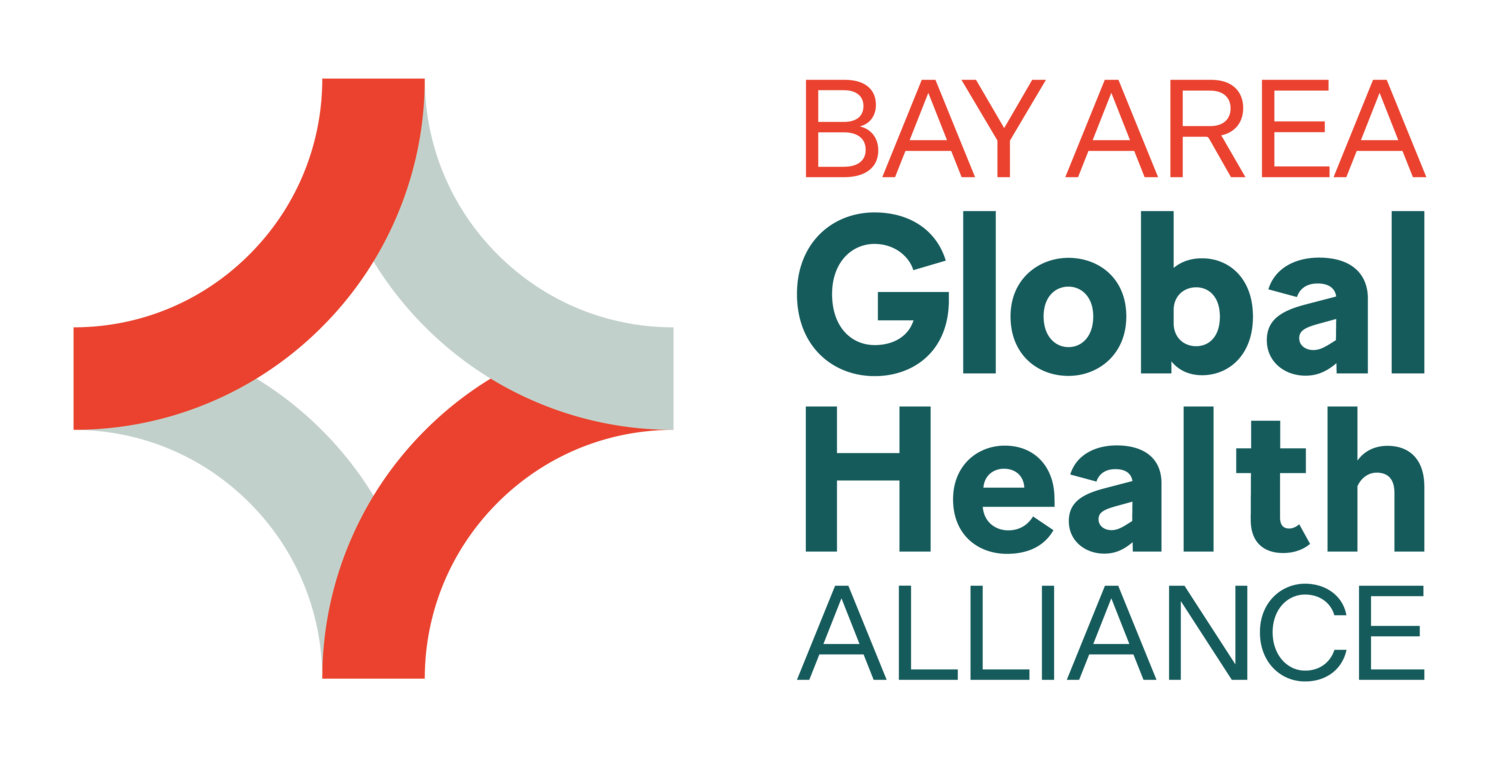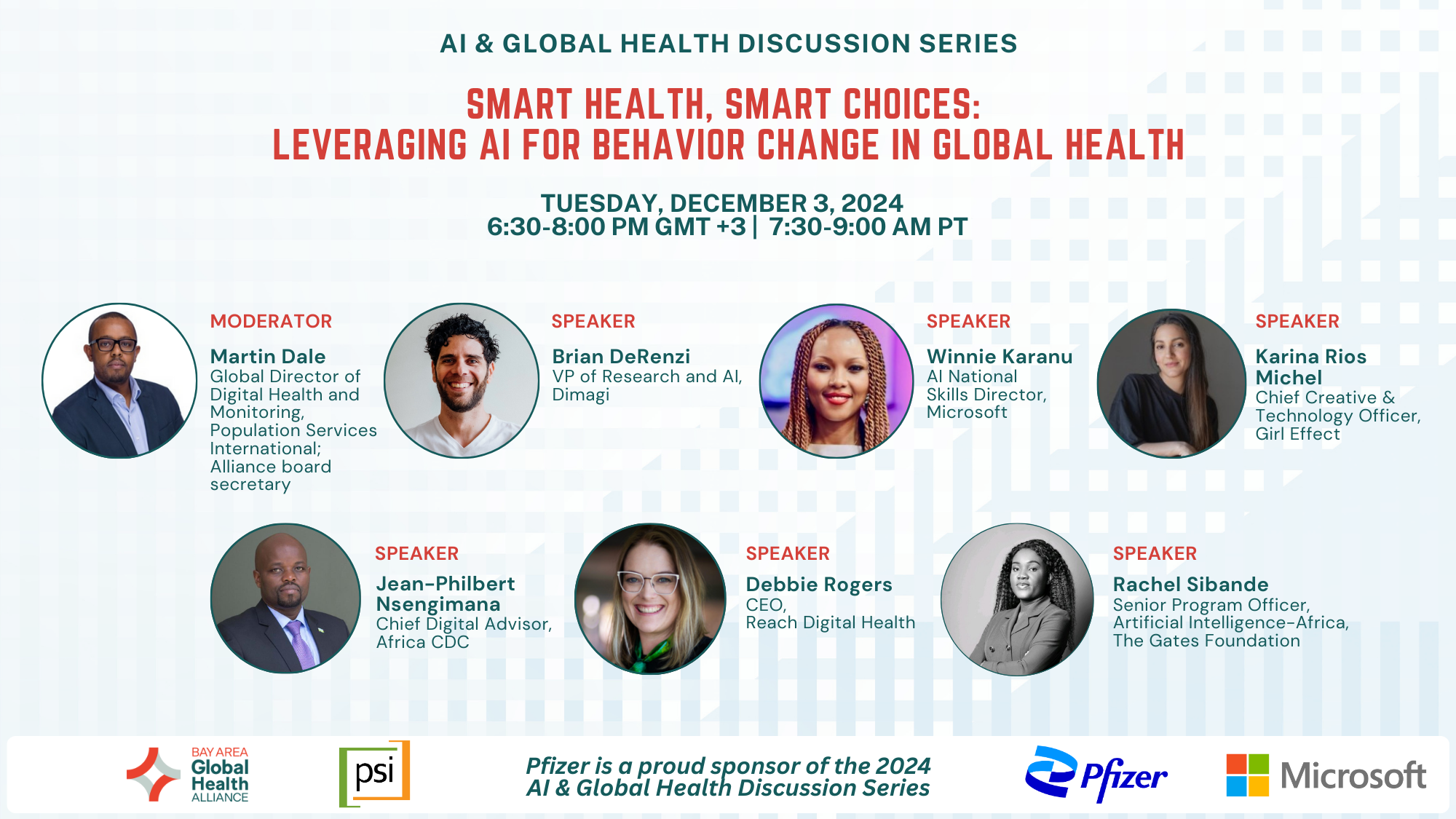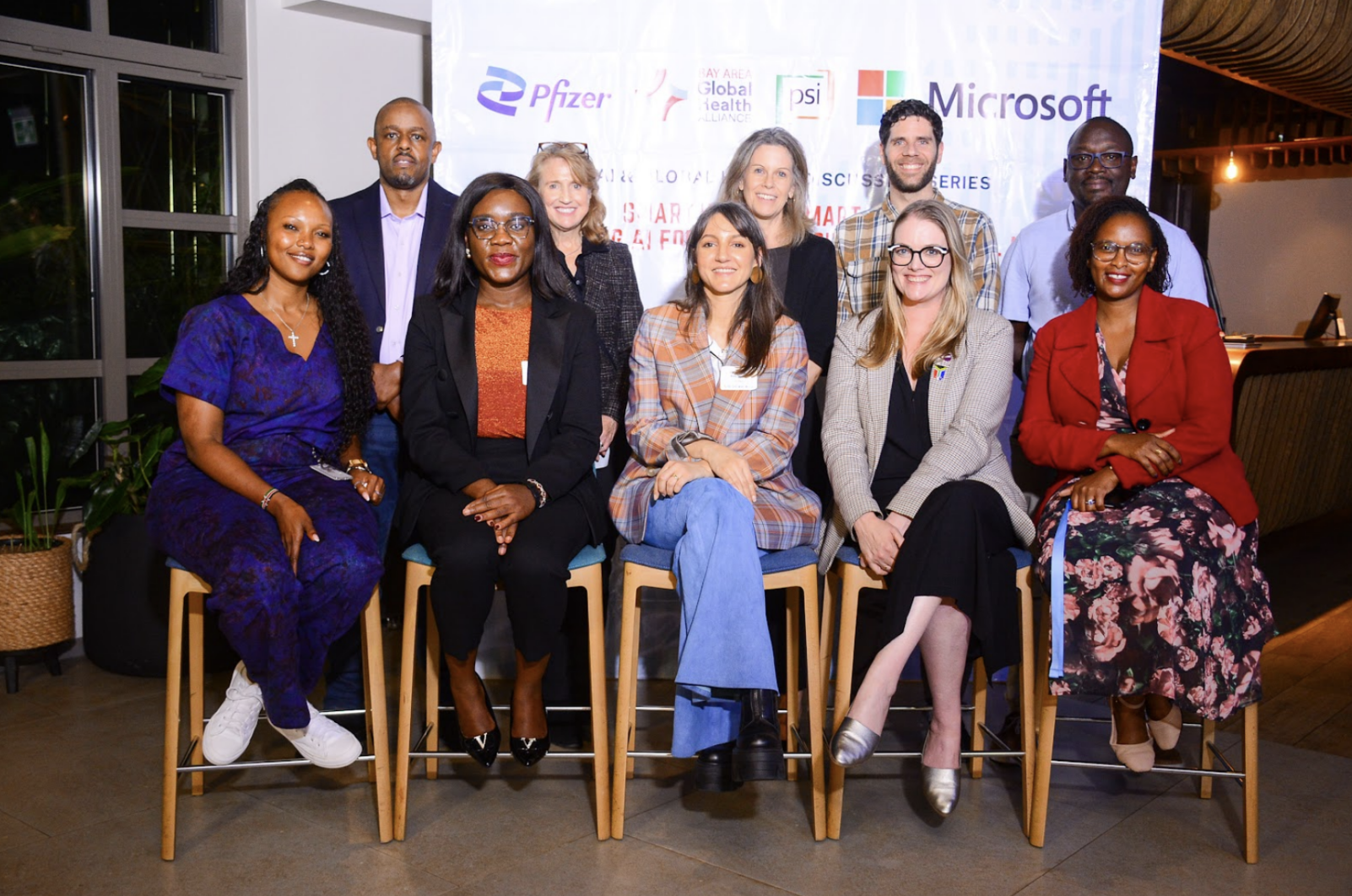
Speakers and co-hosts of the session pictured together.
On December 3, the Alliance, in partnership with Population Services International (PSI), brought together global health and international development leaders in person at the Microsoft Africa Development Centre in Nairobi and online to explore how artificial intelligence (AI) can be leveraged to promote positive health behaviors and create healthier futures for all. This convening marked the final session in our 2024 AI and Global Health Discussion Series, sponsored by Pfizer.
The session highlighted how AI is transforming social and behavior change (SBC) by incorporating inclusive language, non-judgmental communication, and robust privacy features in chatbots to create safe, personalized, and culturally relevant spaces for individuals to engage in sensitive health discussions and adopt positive behaviors.
“There is a clear need for us to think about AI fluency across the board, in terms of demystifying it to make sure that everyone understands what AI is,” said Winnie Karanu, AI national skills director at Microsoft Philanthropies, highlighting the importance of learning pathways and capacity-building to maximize the potential of AI for SBC initiatives.
Moderated by Martin Dale, Alliance board secretary and global director of Digital Health and Monitoring at PSI, the session aimed at putting a tighter lens on consumer-facing interventions. “How can you use AI when you’re dealing with direct-to-consumer opportunities?” questioned Dale, setting the stage for the discussion to follow.
Jean-Philbert Nsengimana, chief digital advisor at Africa CDC, laid out four priorities for governments in using AI in health systems: digitizing primary care to reach underserved populations, driving innovation through partnerships, expanding workforce capacity with AI-powered personalized training, and improving organizational transparency with better data management.
“With the right skills, aided by AI, both to deliver and power solutions, we can reach our universal health coverage objectives,” Nsengimana stated, underscoring AI’s potential to have a “multiplier effect” in resource-limited settings.
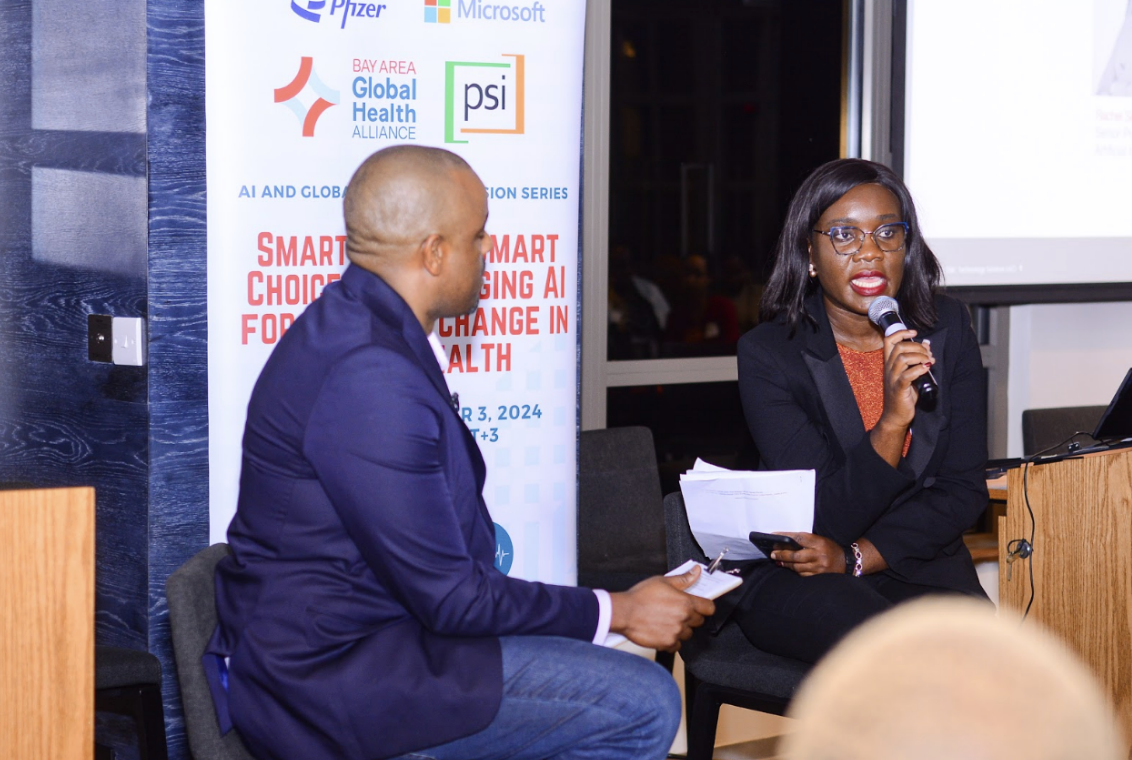
Martin Dale and Rachel Sibande engage in discussion.
Providing a donor perspective, Rachel Sibande, senior program officer for artificial intelligence – Africa at the Gates Foundation, outlined theimmense opportunities AI offers to revolutionize healthcare in low- and middle-income countries (LMICs). “At the foundation, the reason we exist is to save lives, so investments in health are key. AI provides immense potential to enhance health service delivery in a number of ways,” she explained.
Sibande emphasized the need for AI to address Africa’s critical healthcare worker shortage, with 4.2 million community health workers needed across the continent. “Technology, and in particular AI, provides immense potential for us to leapfrog that gap,” she said. AI is already showing promise in improving clinical decision support, helping community health workers make better decisions for triaging, understanding patient symptoms, and developing treatment plans.
“We must make sure that AI leaves no one behind — that includes language, ensuring that their culture, and nuances within that, are included,” added Sibande, calling for the responsible development of AI, urging stakeholders to address bias in AI models and ensure that they are inclusive.
“At the foundation, the reason we exist is to save lives, so investments in health are key. AI provides immense potential to enhance health service delivery in a number of ways…technology, and in particular AI, provides immense potential for us to leapfrog that gap [Africa’s critical healthcare worker shortage].” — Rachel Sibande, Senior Program Officer, Artificial Intelligence–Africa at The Gates Foundation
Following the discussion on the broader potential of AI in global health, the session’s focus shifted to three organizations – Dimagi, Reach Digital Health, and Girl Effect. All are making significant strides in utilizing AI for SBC initiatives and directly applying AI to tackle pressing health challenges in LMICs, demonstrating its real-world impact.
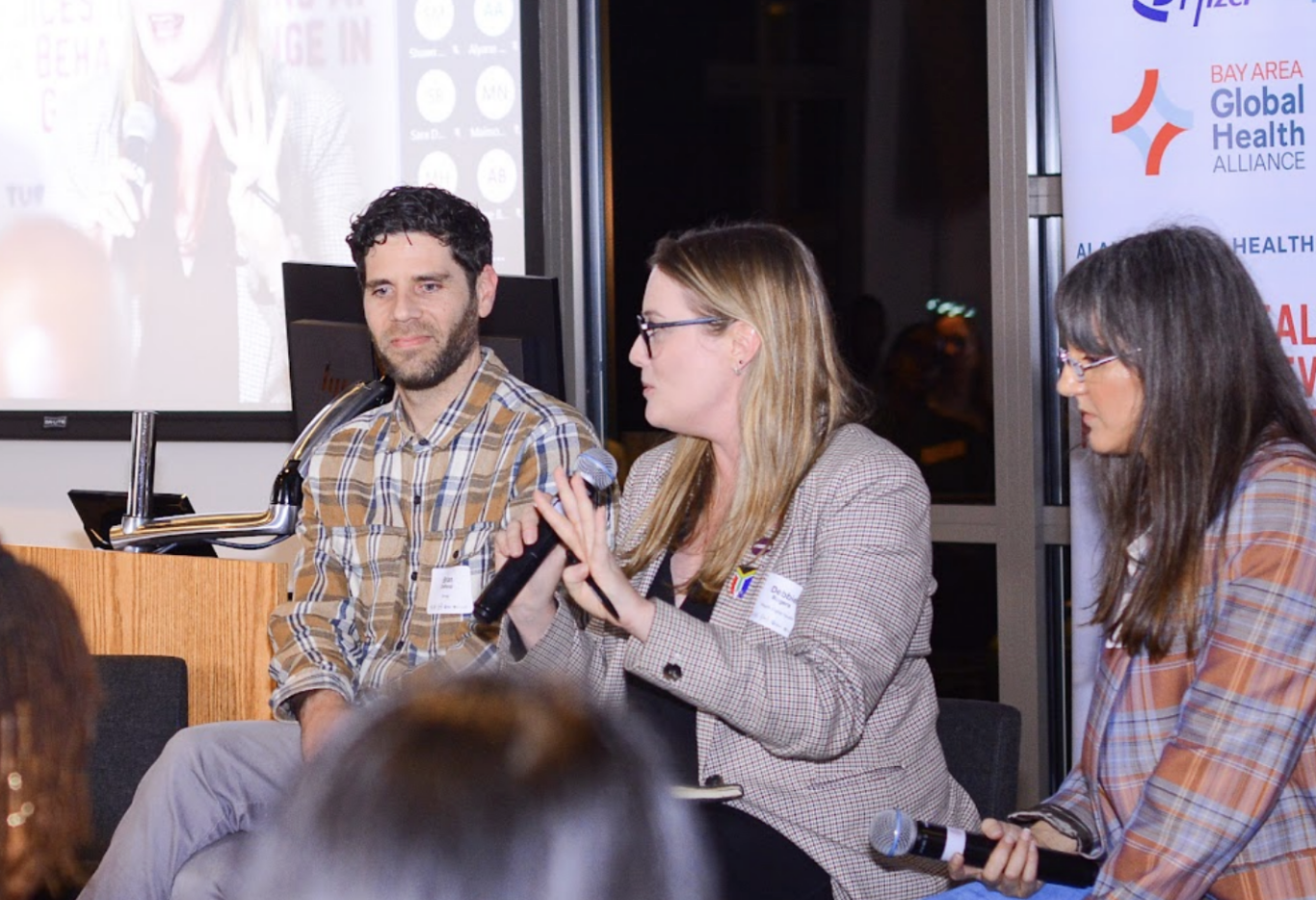
Brian DeRenzi, Debbie Rogers, and Karina Rios Michel share their insights in a panel conversation.
Kicking off the case study presentations, Brian DeRenzi, VP of research and AI at Dimagi, shared insights into how the organization is harnessing large language models (LLMs) to transform health communication and behavior change efforts in Africa, working with the Gates Foundation and two organizations — Shujaaz in Kenya and RAES in Senegal — to develop chatbots that engage young people about family planning.
One challenge highlighted by DeRenzi was the issue of “hallucinations” in AI, instances where AI models generate inaccurate or fabricated information. He emphasized the importance of establishing clear evaluation thresholds and regular checks to manage these concerns.
“With the current state of technology, we cannot guarantee we’ll eliminate hallucinations, but we need to define what’s acceptable and come up with some threshold,” he said. In discussing the gold star of high accuracy, low cost, and latency, DeRenzi shared, “There is no silver bullet; there’s some trade-off that needs to be made at this moment in time between these things.”
Debbie Rogers, CEO of Reach Digital Health, shared several lessons learned from their work integrating AI into their health communication programs, such as their flagship MomConnect, which supports pregnant women and new mothers. She highlighted the importance of personalization in maintaining long-term engagement and changing behaviors. “We’ve found that using personalization has really helped us to keep women engaged throughout this process,” she explained.
Rogers also emphasized the need for scalable solutions, noting how AI-driven natural language processing helped them manage a surge in user engagement: “We realized that we needed to quickly understand the intent of the messages that were sent and prioritize those with potential danger signs.”
Karina Rios Michel, chief creative and technology officer at Girl Effect, shared how AI-powered chatbots and social norms programming are transforming youth health communication. These platforms have reached 1.3 million users, focusing on non-judgmental health messaging and integrating a human loop to drive engagement.
“Young people are 1.4 times more likely to uptake new behaviors when they talk about them,” Rios Michel said, emphasizing the power of conversation in behavior change. She also highlighted a 200% engagement rate with LLMs. Still, she noted the challenges: “There is no off-the-shelf solution,” pointing to how resource-intensive it is to ensure safety and accuracy in AI model development. Despite these challenges, Rios Michel sees tremendous potential for AI in creating safe spaces for young people to discuss sensitive health topics and drive meaningful behavior change.
Across the board, the implementers stressed the necessity of ethical frameworks, scalability, and long-term sustainability in AI interventions for SBC. Rogers emphasized the importance of designing AI interventions with scalability in mind, advising to “design for scale from the beginning.” Rios Michel echoed this by highlighting the need to “start with the problem, then consider if AI is the most appropriate technology to solve for that.” She also pointed out the importance of ethical practices in data protection when working with vulnerable populations. DeRenzi added that “evals [evaluations] are vital” to ensure AI remains effective and aligned with ethical standards.
With thanks to Microsoft Africa Development Centre for generously hosting us. Special thanks to Pfizer, sponsor of the 2024 Bay Area Global Health Alliance AI and Global Health Discussion Series.
Check out our AI and Global Health Discussion Series for more on AI for health.
Key Takeaways
– Personalized Engagement for Behavior Change: AI-powered chatbots and tools create personalized, non-judgmental spaces, enabling deeper engagement and increasing the likelihood of behavior adoption. Sustained interaction over time is critical for fostering meaningful changes in health behaviors.
– Language Inclusivity and Cultural Relevance: AI must address local language needs and cultural nuances to ensure inclusivity. Investing in datasets and tools tailored for low-resource languages enhances accessibility and ensures SBC initiatives resonate with local populations.
– Empowering Community Interactions: AI acts as a bridge to amplify the reach of health workers, supporting interactions through tools that assist with decision-making and information dissemination, particularly in resource-limited settings.
– Scaling Positive Health Behaviors: AI provides the ability to scale SBC interventions efficiently by automating repetitive tasks, analyzing vast datasets, and providing timely responses to users, reducing the strain on human resources.
– Data-Driven Insights for SBC: AI enables the analysis of large volumes of data to identify patterns, improve messaging strategies, and deliver context-specific interventions that increase program effectiveness.
– Fostering Safe and Ethical Conversations: Privacy is critical in AI-powered chatbots, particularly when addressing sensitive topics like reproductive health and mental well-being. Ensuring robust data protection, ethical guidelines, and secure systems helps foster trust and encourage open dialogue, essential for effective SBC initiatives.
– Real-Time Support and Accessibility: AI offers immediate responses to health queries through chatbots and voice systems, which are impactful for youth and underserved communities seeking accessible health information.
– Driving SBC Across Platforms: AI can be integrated within diverse platforms like SMS, WhatsApp, and multimedia campaigns, ensuring reach across different digital access levels while supporting comprehensive SBC programs.
Speakers
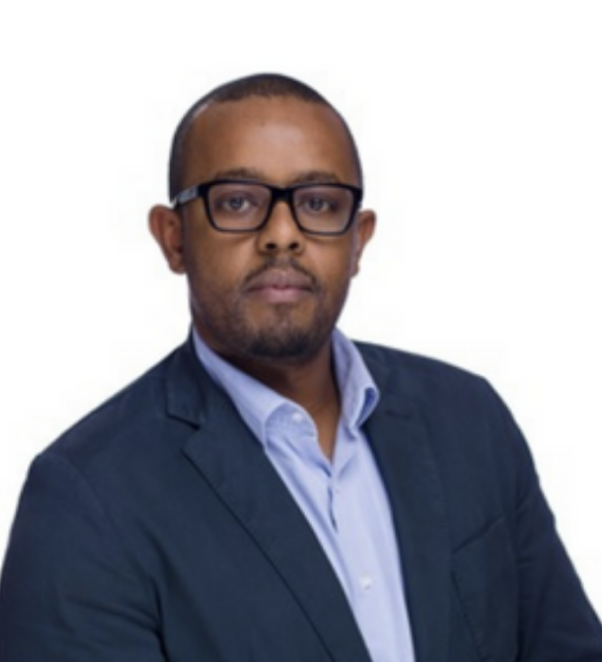 Martin Dale, Global Director, Digital Health and Monitoring, PSI; Board Secretary, Bay Area Global Health Alliance
Martin Dale, Global Director, Digital Health and Monitoring, PSI; Board Secretary, Bay Area Global Health Alliance
As director for digital health and monitoring at Population Services International, Martin Dale is responsible for executing the institution’s digital strategy focused on increasing access and personalized delivery of health information, products and services using digital solutions. In addition, he is responsible for powering data-driven performance improvement using routinely available data. Martin previously served as PSI’s deputy director within the evidence department and has held other roles in the organization, including at the field level at PSI South Sudan as a monitoring and evaluation specialist. Martin joined PSI from the British Civil Service, where he worked as a government senior policy analyst for several years. He earned a bachelor’s degree in development economics and a master’s degree in demography, both from institutions in the United Kingdom.
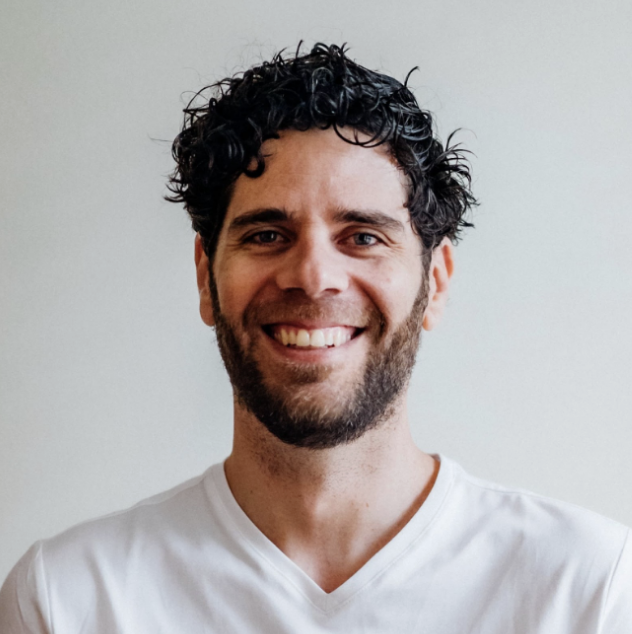 Brian DeRenzi, VP of Research and AI, Dimagi
Brian DeRenzi, VP of Research and AI, Dimagi
Brian DeRenzi is the VP of Research and AI at Dimagi, a social enterprise building technology to support service delivery for underserved populations, often in low-income settings. He is a computer scientist with extensive field experience applying information technologies to improve health outcomes and service delivery in resource-constrained environments. He has published and lectured extensively in ICT4D, HCI, and public health. At Dimagi, Brian leads research and AI initiatives, including the development of Open Chat Studio, a platform designed to make it easy to build, test, develop and deploy LLM-powered interventions. Before joining Dimagi, he helped launch the health research group at IBM Research – Africa in Nairobi and was a tenure-track faculty in the computer science department at the University of Cape Town. Brian holds a PhD in computer science & engineering from the University of Washington and was a Fulbright Fellow.
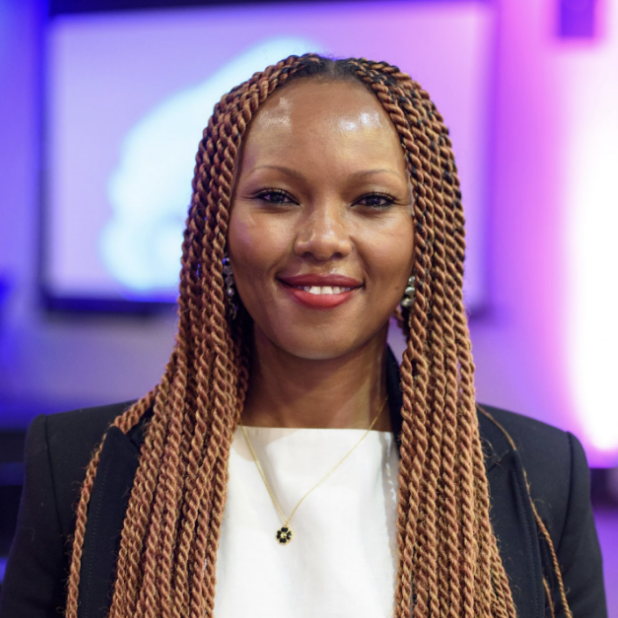 Winnie Karanu, AI National Skills Director, Microsoft
Winnie Karanu, AI National Skills Director, Microsoft
Winnie is a strategic leader with an outstanding record of leading new initiatives in the public sector, corporate social responsibility, and leadership development programs. She has over 15 years of experience in business development and program management, covering various aspects such as designing and implementing regional skills and leadership development programs, building and managing strategic partnerships with industry and ecosystem stakeholders, product development, and change management. Winnie is the AI national skills director at Microsoft Philanthropies, a global, multi-disciplinary team that combines corporate social responsibility, sales, and engineering functions to help promote inclusive economic growth. Philanthropies plays a crucial role in navigating the opportunities and challenges presented by this pivotal moment in AI. AI holds immense potential to empower workers globally, including in Africa. However, this can only be realized if everyone everywhere, possesses the skills to utilize it. This initiative aims to equip users, developers, and organizational leaders with AI skills at scale, unlocking AI’s potential to develop lasting solutions and deliver impact at scale. Previously, she was at the Africa Transformation Office (ATO) as a business development manager, strategic partnerships, where she built partnerships with international organizations, governments and ecosystem enablers. Before joining ATO, she was the business development manager for public sector at 4Afrika, where she led the industry strategy and partnered with governments, development banks, startups, and NGOs to drive scaled growth in the agriculture industry. She was appointed as an advisor and representative of the private sector to several committees, including the Blueprint for Digital Transformation of Agriculture in Africa by Smart Africa.
 Karina Rios Michel, Chief Creative and Technology Officer, Girl Effect
Karina Rios Michel, Chief Creative and Technology Officer, Girl Effect
Karina Rios Michel serves as the chief creative and technology officer at Girl Effect, a global organization dedicated to harnessing the power of digital media and technology to empower adolescent girls in Africa and South Asia. With over 15 years of expertise in design, innovation, and product development, she leads a diverse, cross-functional team that creates beloved brands and media products for girls. Girl Effect’s portfolio includes AI-powered chatbots, YouTube talk shows, IVR games, and radio dramas. Her overarching mission is to bridge the gap for teenage girls by providing them with the information, inspiration, and connections necessary to expand their choices and broaden their opportunities. In her previous role as the director of product design and development, she spearheaded the creation of Girl Effect’s groundbreaking AI-powered chatbot, Big Sis. This platform offers girls trusted and non-judgmental advice on sexual, reproductive, and mental health topics. Notably, Big Sis has been recognized as a finalist in the Fast Company 2022 World Changing Idea Award, was shortlisted for the 2022 GLOMO Award in the Best Mobile Innovation for Emerging Markets category, and was awarded a Shorty Award in 2023.
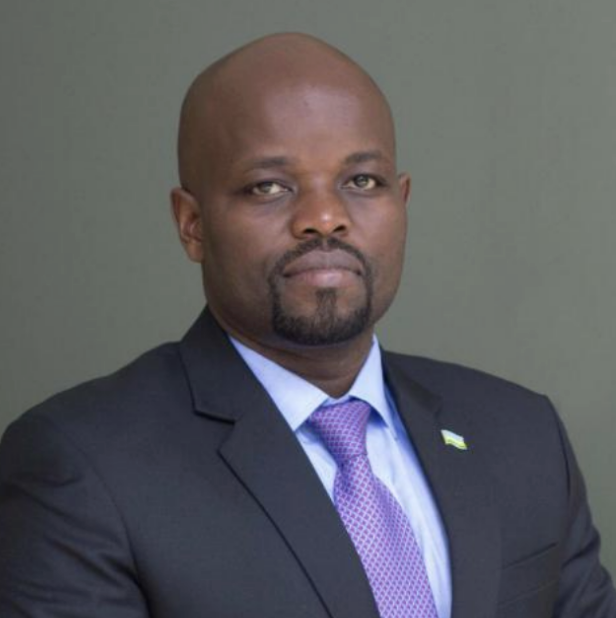 Jean-Philbert Nsengimana, Chief Digital Advisor, Africa CDC
Jean-Philbert Nsengimana, Chief Digital Advisor, Africa CDC
Jean-Philbert Nsengimana is the chief digital advisor for the Africa CDC. Previously, he was the Africa managing director at the Commons Project, working to unlock the full potential of technology and data for the common good. He serves on many boards, includingthe Alliance for Affordable Internet, where he is the honorary chairperson, and the Place Fund, i4Policy, Startup Genome, and Future State. Nsengimana’s career spans the public, international development, and the private sectors. Most recently, he served as Rwanda’s minister of youth and ICT (information & communication technology). During his tenure, he spearheaded the Smart Africa Alliance and YouthConnekt Africa — two pan-African organizations focused on accelerating digital transformation and youth empowerment. Before joining the government, Nsengimana was the country manager for Voxiva Rwanda, leading the design and implementation of mobile technology platforms that helped the Rwandan government successfully scale up major national public health programs, including HIV/AIDS and its integrated disease surveillance and response. Before Voxiva, he served as the Africa coordinator for the Development Gateway Foundation, extending digital platforms for managing official development aid and public procurement to 15 countries. Nsengimana holds a master’s degree in public administration from the Harvard Kennedy School of Government, a global MBA in information technology, a master’s degree in software engineering, and a bachelor’s degree in computer science.
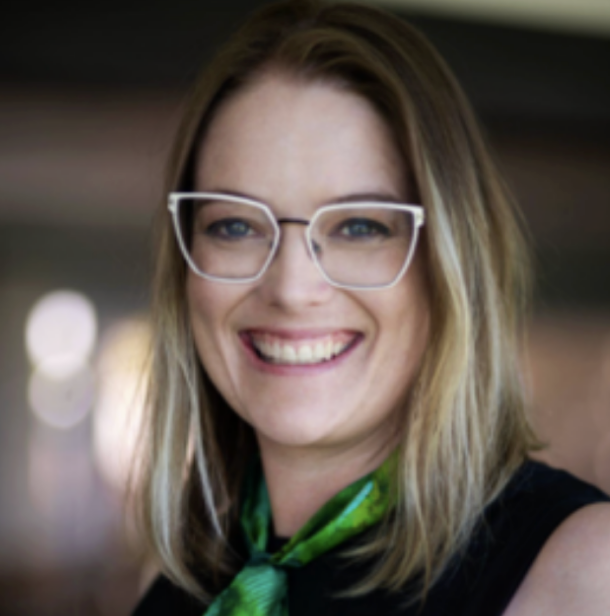 Debbie Rogers, Chief Executive Officer (CEO), Reach Digital Health
Debbie Rogers, Chief Executive Officer (CEO), Reach Digital Health
Debbie Rogers, a dynamic leader passionate about advancing mobile technology for health, brings a wealth of experience and expertise to her role as CEO of Reach Digital Health and a board member of Turn.io. Her leadership tenure at Reach, spanning over a decade, has demonstrated her ability to drive innovation, deliver impactful solutions, grow the organization, and expand its program to new African territories. Recently, under her leadership, Reach was successfully granted institutional funding, including the Skoll Award and a generous gift from Mackenzie Scott. Debbie is passionate about and dedicated to promoting diversity and inclusion in the technology sector, particularly in Africa.
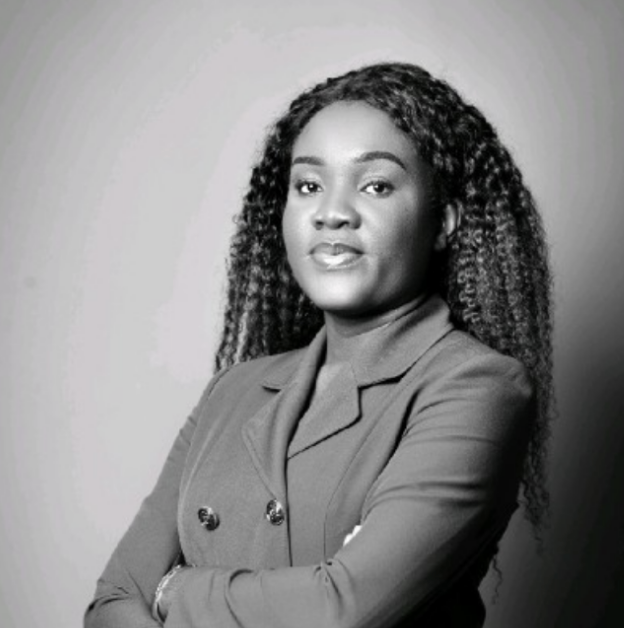 Rachel Sibande, Senior Program Officer, Artificial Intelligence – Africa, The Gates Foundation
Rachel Sibande, Senior Program Officer, Artificial Intelligence – Africa, The Gates Foundation
Rachel Sibande is the founder of Malawi’s first technology and innovation hub, mHub. Rachel’s career in the global development sector has cut across the following domains: digital, agriculture, nutrition, digital financial services, public health, disaster management, and elections monitoring. She has led development projects in over 22 countries. She currently serves as senior program officer in the global development division at the Bill and Melinda Gates Foundation (BMGF). Before joining BMGF, she led the deployment of big data, artificial intelligence, and machine learning models for development in Africa at the United Nations Foundation. She is a computer scientist by training, and she specialised in cryptography and data science. Rachel has just completed a PhD in computer science at Rhodes University in South Africa.
